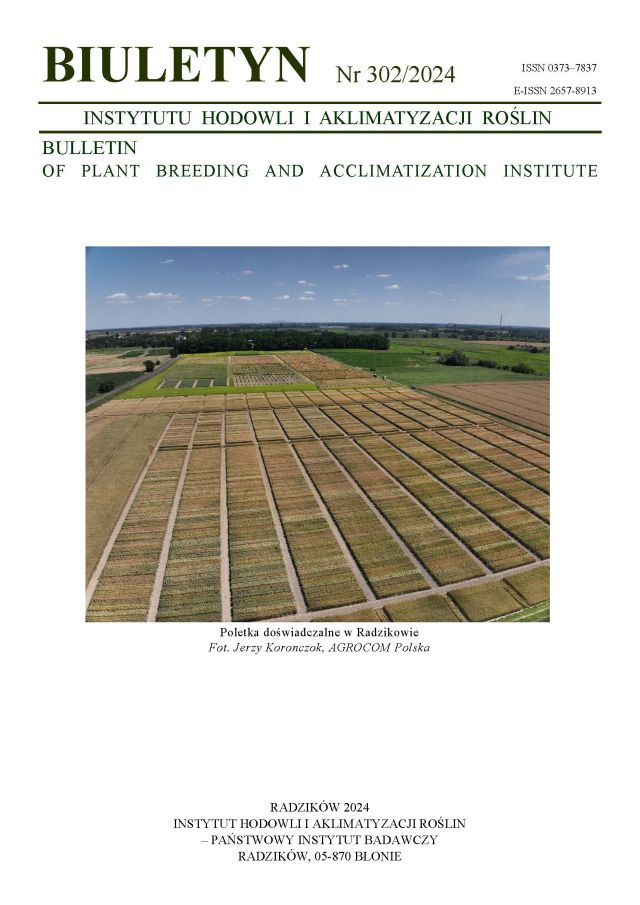Effect of sowing rate and sowing date on grain yield and its structure in spring barley cultivars
Kazimierz Noworolnik
iung@iung.pulawy.plZakład Uprawy Roślin Zbożowych, Instytut Uprawy, Nawożenia i Gleboznawstwa w Puławach (Poland)
Danuta Leszczyńska
Zakład Uprawy Roślin Zbożowych, Instytut Uprawy, Nawożenia i Gleboznawstwa w Puławach (Poland)
Abstract
The response of several spring barley cultivars to sowing rate and sowing date was investigated in a microplot experiment in the years 2000–2002. All the cultivars responded with increase of grain yield to the increase of sowing rate (up to 450 seed/m2). The highest effects were recorded for the cultivars Sezam and Granal, the lowest one for the cultivar Blask. At the delayed sowing, the highest decrease of yield showed the cultivar Anabell, Granal and Sezam were most tolerant. Variability of the grain yield, in dependence on the studied factors, was related to differentiation in number of ears per unit area, as the seed number per ear and weight of 1000 seeds did not vary significantly.
Keywords:
cultivars, grain yield, sowing date, sowing rate, spring barleyReferences
Farack M., Hansel A. 1987. Ergebnisse agrotechnischer Prüfungen zu Sommergerste in Vorgebirgslagen. Feldversuchswesen. 1: 30 — 41.
Google Scholar
Fatyga J. 1984. Wpływ terminów siewu na wysokość i jakość plonów ziarna jęczmienia jarego i ozimego. Zesz. Probl. Post. Nauk Rol. 305: 251 — 256.
Google Scholar
Fatyga J., Chrzanowska-Drożdż B., Liszewski M. 1993. Wpływ terminów siewu na wysokość plonów ziarna i słomy jęczmienia jarego. Rocz. Nauk. Rol. Ser. A 109: 153 — 158.
Google Scholar
Noworolnik K. 1995. Reakcja odmian i rodów jęczmienia jarego na gęstość siewu i termin siewu. Biul. IHAR 193: 45 — 49.
Google Scholar
Noworolnik K. 1995. Wpływ gęstości siewu na wielkość i strukturę plonu ziarna jęczmienia jarego sześciorzędowego na tle dwurzędowego. Biul. IHAR 193: 51 — 54.
Google Scholar
Noworolnik K., Leszczyńska D. 1997. Plonowanie odmian i rodów jęczmienia jarego w zależności od terminu siewu. Biul. IHAR 201: 225 — 230.
Google Scholar
Noworolnik K., Leszczyńska D. 1998. Porównanie reakcji odmian jęczmienia jarego na termin i gęstość siewu. Pam. Puł. 112: 163 — 168.
Google Scholar
Noworolnik K., Leszczyńska D. 2000. Reakcja nowych odmian jęczmienia jarego na gęstość siewu. Biul. IHAR 214: 159 — 162.
Google Scholar
Ruszkowski M. 1998. Obsada i produktywność roślin zbożowych. Mat. Konf. Nauk. „Obsada a produktywność roślin uprawnych” Cz. I: 7 — 24.
Google Scholar
Sarapa N. G. 1986. Urożajnost jacmenja i osobennosti formirovanija ego struktury. Agrot. i fizjol. faktory povysenija prod. zernovych: 68 — 71.
Google Scholar
Simmons S. R., Rasmusson D. C., Wiersma J. V. 1982. Tillering in barley: genotype, row spacing and seeding rate effects. Crop. Sci. 22, 4: 801 — 805.
DOI: https://doi.org/10.2135/cropsci1982.0011183X002200040024x
Google Scholar
Authors
Kazimierz Noworolnikiung@iung.pulawy.pl
Zakład Uprawy Roślin Zbożowych, Instytut Uprawy, Nawożenia i Gleboznawstwa w Puławach Poland
Authors
Danuta LeszczyńskaZakład Uprawy Roślin Zbożowych, Instytut Uprawy, Nawożenia i Gleboznawstwa w Puławach Poland
Statistics
Abstract views: 16PDF downloads: 7
License
Copyright (c) 2004 Kazimierz Noworolnik, Danuta Leszczyńska

This work is licensed under a Creative Commons Attribution-ShareAlike 4.0 International License.
Upon submitting the article, the Authors grant the Publisher a non-exclusive and free license to use the article for an indefinite period of time throughout the world in the following fields of use:
- Production and reproduction of copies of the article using a specific technique, including printing and digital technology.
- Placing on the market, lending or renting the original or copies of the article.
- Public performance, exhibition, display, reproduction, broadcasting and re-broadcasting, as well as making the article publicly available in such a way that everyone can access it at a place and time of their choice.
- Including the article in a collective work.
- Uploading an article in electronic form to electronic platforms or otherwise introducing an article in electronic form to the Internet or other network.
- Dissemination of the article in electronic form on the Internet or other network, in collective work as well as independently.
- Making the article available in an electronic version in such a way that everyone can access it at a place and time of their choice, in particular via the Internet.
Authors by sending a request for publication:
- They consent to the publication of the article in the journal,
- They agree to give the publication a DOI (Digital Object Identifier),
- They undertake to comply with the publishing house's code of ethics in accordance with the guidelines of the Committee on Publication Ethics (COPE), (http://ihar.edu.pl/biblioteka_i_wydawnictwa.php),
- They consent to the articles being made available in electronic form under the CC BY-SA 4.0 license, in open access,
- They agree to send article metadata to commercial and non-commercial journal indexing databases.
Most read articles by the same author(s)
- Kazimierz Noworolnik, Danuta Leszczyńska, The response of naked spring barley to sowing rate in comparison to husked barley , Bulletin of Plant Breeding and Acclimatization Institute: No. 233 (2004): Regular issue
- Alicja Sułek, Danuta Leszczyńska, Actual state and perspectives of oats cultivation in Poland , Bulletin of Plant Breeding and Acclimatization Institute: No. 231 (2004): Regular issue
- Danuta Leszczyńska, Kazimierz Noworolnik, Comparison of response of six-row and two-row winter barley cultivars to nitrogen fertilization level and sowing date , Bulletin of Plant Breeding and Acclimatization Institute: No. 237/238 (2005): Regular issue
- Kazimierz Noworolnik, Danuta Leszczyńska, Effect of nitrogen rate on yielding of spring barley cultivars in a pot experiment , Bulletin of Plant Breeding and Acclimatization Institute: No. 237/238 (2005): Regular issue














